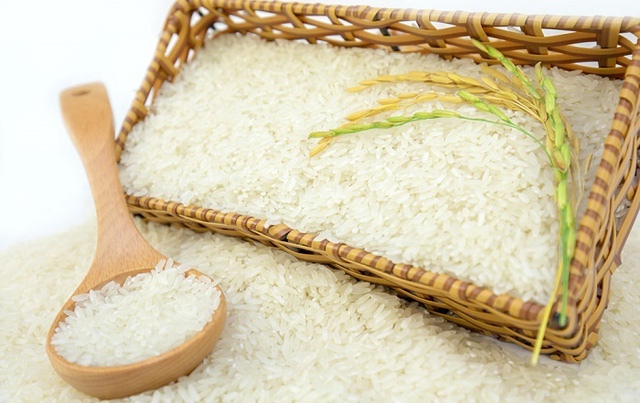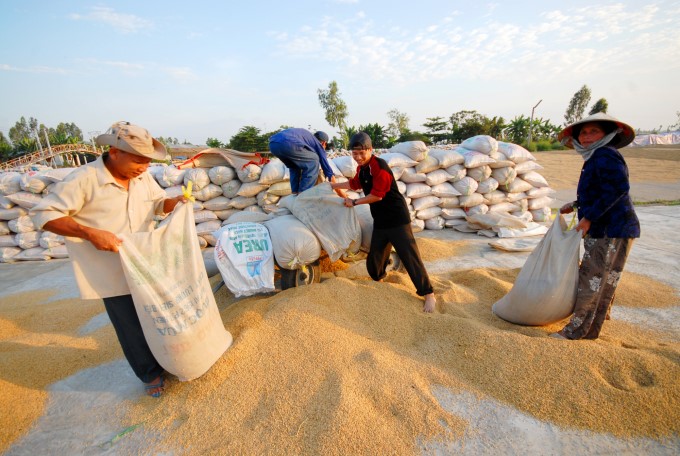June 18, 2025 | 10:45 GMT +7
June 18, 2025 | 10:45 GMT +7
Hotline: 0913.378.918
June 18, 2025 | 10:45 GMT +7
Hotline: 0913.378.918

Rice export to the US increased sharply in the first quarter of 2021. Photo: TL.
U.S. rice imports have increased in recent decades, largely because of the growing demand for aromatic varieties, partly driven by the expanding population of rice-consuming ethnic groups. Aromatics, primarily jasmine and basmati rice, are imported from Thailand, India, Pakistan, and Vietnam.
U.S. plant breeders have yet to develop aromatic rice varieties with the same characteristics as these specific Asian varieties. Imports of aromatic rice are expected to continue increasing until U.S. breeders develop varieties that satisfy this part of domestic demand.
According to the General Department of Customs, in March 2021, Vietnam's rice export to the US reached 1.9 thousand tonnes of rice, worth US$ 1.4 million, up 44.3% in volume and 23.2% in value compared to the previous month; increased by 6.3% in volume and 18.1% in value over the same period in 2020.
Total rice export turnover to the US market in the first 3 months of 2021 reached 5,000 tonnes, worth US$3.8 million, up 18.5% in volume and 40.5% in value over the same period in 2020.
In March 2021, aromatic rice is Vietnam's main export product to the US, reaching 1.3 thousand tons, worth US$ 1 million, accounting for 68.6% in volume and 76.1% in value. Compared to the same period last year, aromatic rice export to the US increased 24.5% in volume and 37.1% in value.
The second place is white rice with 0.4 thousand tonnes, worth US$ 0.2 million, accounting for 22.6% in volume and 15.4% in value.
The export price of aromatic rice to the US in March 2021 averaged US$ 746.1 per tonne, up 2.1% over the same period last year, while the price of white rice reached US$ 530.3 per tonne, up 12.7 %.
In the first four months of 2021, Vietnam's rice export to the majority of markets witnessed an impressive increase in both volume and value in comparison to the same period last year.
Vietnam's rice export rose in both volume and values for a second consecutive month in April 2021 with an increase of above 45% in both volume and value compared to the previous month, reaching 782,159 tonnes, and worth US$ 424.22 million. In comparison to the same period of 2020, the export volume also increased 53.3% while the value advanced 66.8%. The export price of rice in April 2021 averaged US$ 542.4 per tonne, an 8.8% increase in the same period of 2020.
In the first four months of 2021, the country's rice export reached over 1.93 million tonnes with a value of US$ 1.07 billion, down 6.4% in volume but up 8.2% in value compared to the same period last year. The average export price of rice rose by 15.6% to US$ 543.4 per tonne.

Rice harvest in the Mekong Delta. Photo: Le Hoang Vu.
The above figures show optimistic signals about Vietnam's rice exports in 2021 in the context of the complicated development of the Covid-19 pandemic.
In this month, the US Department of Agriculture (USDA) released the latest projected data on its global rice outlook report.
The report showed that the world food demand and reserves in 2021 will remain at a high level. Global rice imports are expected to be about 44.79 million tons, up 1% compared to 2020.
Countries and territories that are expected to boost their rice imports include the Philippines (up 13%), Cote d’Ivoire (9.1%), Ghana (5.6%), and EU (2.1%).
Among them, China would account for the largest amount of rice imports in 2021 with 2.9 million tons, followed by the EU (2.45 million tons), and the Philippines (2.2 million tons), with all of them being Vietnam’s major rice buyers.
According to USDA, India is expected to remain the largest rice exporter of the world with 15.5 million tons, representing a surge of 940,000 tons year-on-year. Meanwhile, Thailand could be the third by exporting 6.1 million tons, up nearly 400,000 tons.
Vietnam is set to remain the world’s second-largest rice exporter in 2021 with 6.4 million tons, an increase of 233,000 tons compared to last year.
Translated by Ha Phuc
/2025/06/17/2344-1-131758_261.jpg)
(VAN) Amid tariff risks and growing trade barriers in the U.S. market, Australia is emerging as a promising destination to sustain the growth momentum of Vietnam's shrimp exports.
/2025/06/17/2013-1-nongnghiep-112009.jpg)
(VAN) This notable growth trend reflects the global taste for fresh, nutritious fruits and the expanding use of lychees across various sectors.

(VAN) The political and cultural insulation of Japan’s beloved grain is falling apart, and experts warn the country’s relationship with the staple will have to adapt.

(VAN) Noting risks, report examines impacts of avian influenza, changing trade patterns since 2022, fish fraud, and shipping industry’s net-zero goals.

(VAN) Mr. Tran Quang Bao, General Director of the Forestry and Forest Protection Department, met and worked with the International Wood Products Association to promote cooperation in the field of timber trade.

(VAN) China's outbound shipments of rare earths in May jumped 23% on the month to their highest in a year, though Beijing's export curbs on some of the critical minerals halted some overseas sales.

(VAN) To sustain capital flow, administrative reform alone is not enough; what farmers truly need is an ecosystem where both government and businesses grow together in support.